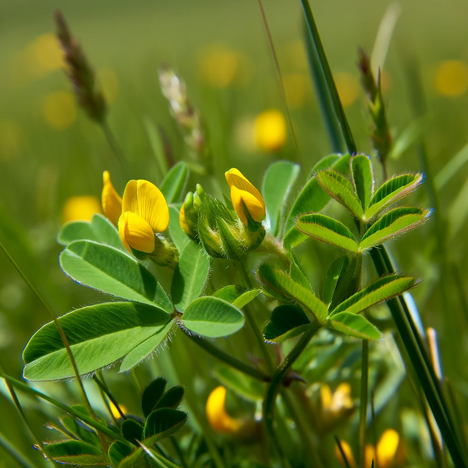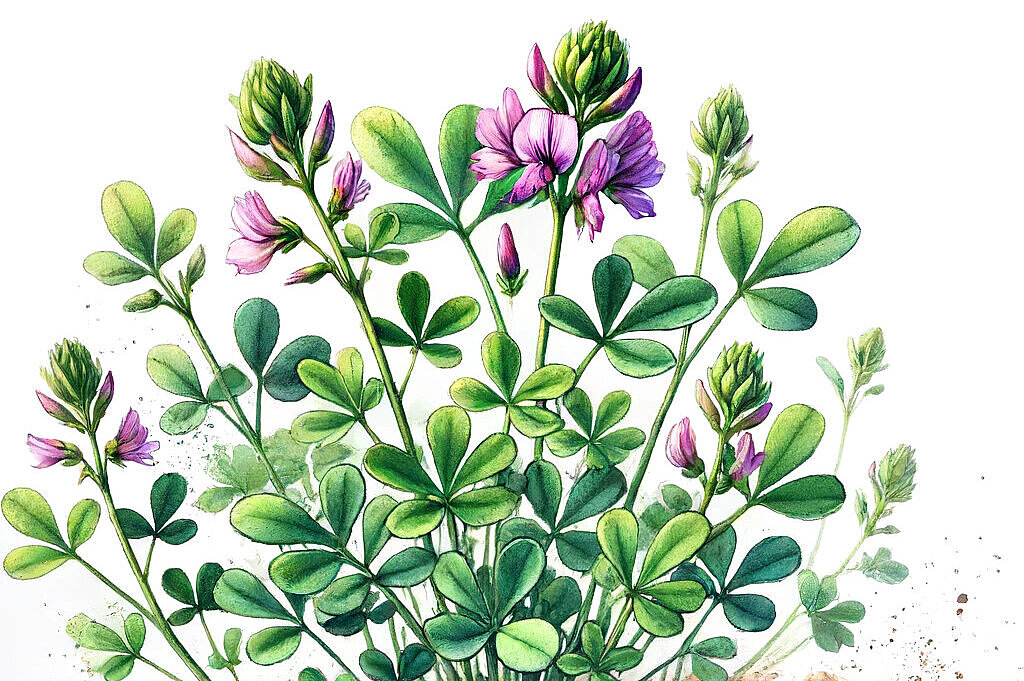Common horn clover

In the diverse world of plants, there are many species that grow in nature and play an important role in the ecosystem. One of these is the common hornwort (Lotus corniculatus), a plant often found in meadows, roadsides and undisturbed landscapes. While it is known for its bright yellow flowers and is a source of food for many insect species, it is important to understand the effects of such plants on pets, especially dogs. In this article, we take a look at common clover and its relevance to dogs.
What is common hornwort?
Common clover, also known as Lotus corniculatus, is a perennial plant that belongs to the legume family (Fabaceae). It is widespread in many parts of the world and prefers to grow in meadows, pastures and other open areas. The plant is characterized by its small, bright yellow flowers, which appear from spring to autumn. Common clover is valued not only for its aesthetics, but also for its ability to fix nitrogen in the soil, making it an important component in the natural cycle.
Properties and occurrence
- Flowering time: Common clover flowers from May to September, with its characteristic yellow flowers arranged in clusters.
- Height: The plant grows to a height of up to 50 cm.
- Locations: It is widespread throughout Europe, North America and other parts of the world and prefers sunny to semi-shady locations with moderately nutrient-rich soil.
Effects on dogs
Benefits
In general, there are no direct benefits of common brome to dogs. The plant is not known to have any nutritional value for pets.
Disadvantages
- Potential Toxicity: Certain parts of the common birdsfoot trefoil can be toxic to dogs in large quantities. It is important to note that consuming large amounts can lead to digestive upset, lethargy or more severe symptoms.
- Allergic reactions: Some dogs may be sensitive to plants and develop allergic symptoms such as skin rashes or itching if they come into contact with the plant.
Recommendations for dog owners
Dog owners should ensure that their dogs do not chew or eat plants such as common wood sorrel, especially if they are prone to gastrointestinal sensitivities. It is advisable to monitor dogs in areas with a high incidence of this plant and ensure that they do not interact with potentially harmful plants.
While common clover is an interesting plant in nature and offers certain ecological benefits, it is important to recognize its potential risks to dogs. The direct benefits to dogs are limited and the possibility of toxicity, although low, should not be ignored. Dog owners should be cautious and keep their pets away from the plant to avoid any potential negative effects. In the world of dog nutrition and safety, it is always better to err on the side of caution and choose natural alternatives that are known to be safe and nutritious for our four-legged friends.
If you notice any signs of hypersensitivity or poisoning in your dog, you should see your vet immediately. We are not a substitute for a vet, but we try to be as accurate as possible. Every dog reacts differently and we recommend you get a second opinion or consult your vet if in doubt.
Stay healthy and take good care of your four-legged friend!😊
Similar to Common horn clover
White clover is a perennial plant that belongs to the legume family (Fabaceae). It is characterized by its small, white, often slightly pink-tinged flowers, which are arranged in spherical heads,...
Meadow clover(Trifolium pratense), often referred to simply as clover, is a legume and is characterized by its trifoliate, sometimes quadrifoliate leaves and its small, usually pink or white...
Sainfoin (Onobrychis viciifolia) is a forage plant from the papilionaceous family that is particularly suitable for horses and ruminants. It has a high content of protein, crude fiber, calcium,...
Alfalfa (Medicago sativa) is a perennial plant from the legume family. It is also known as alfalfa or perennial clover. Alfalfa has long roots that can reach up to four meters deep into the soil....


